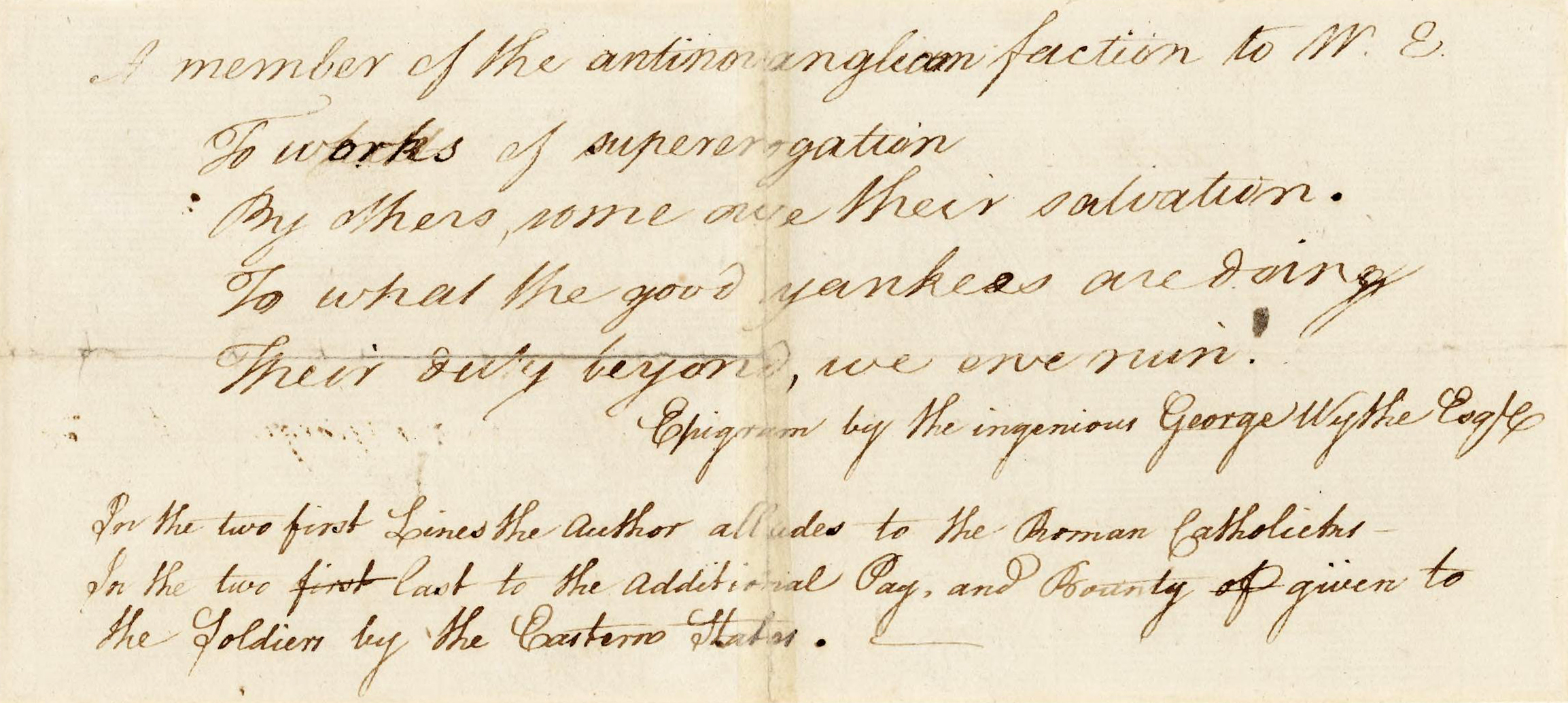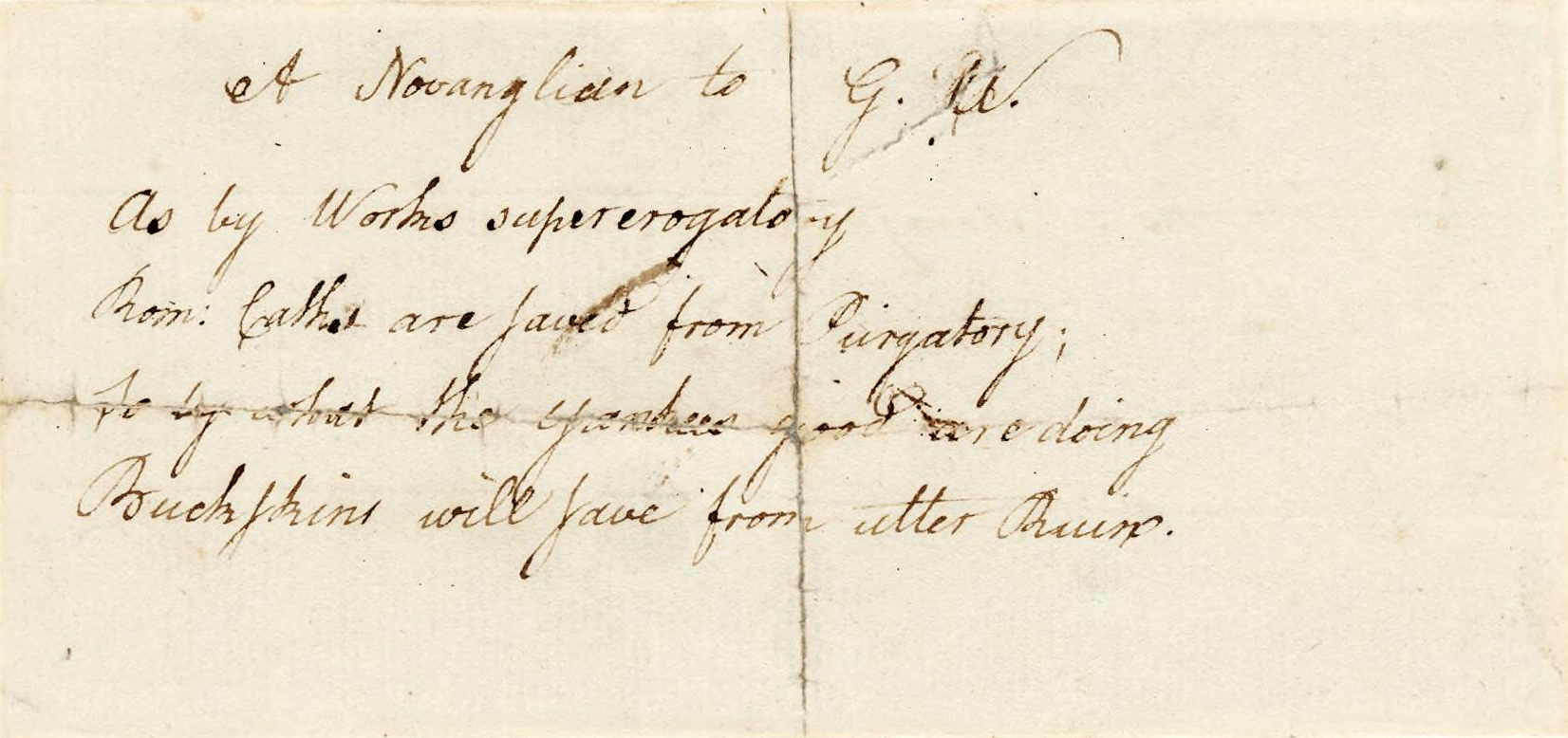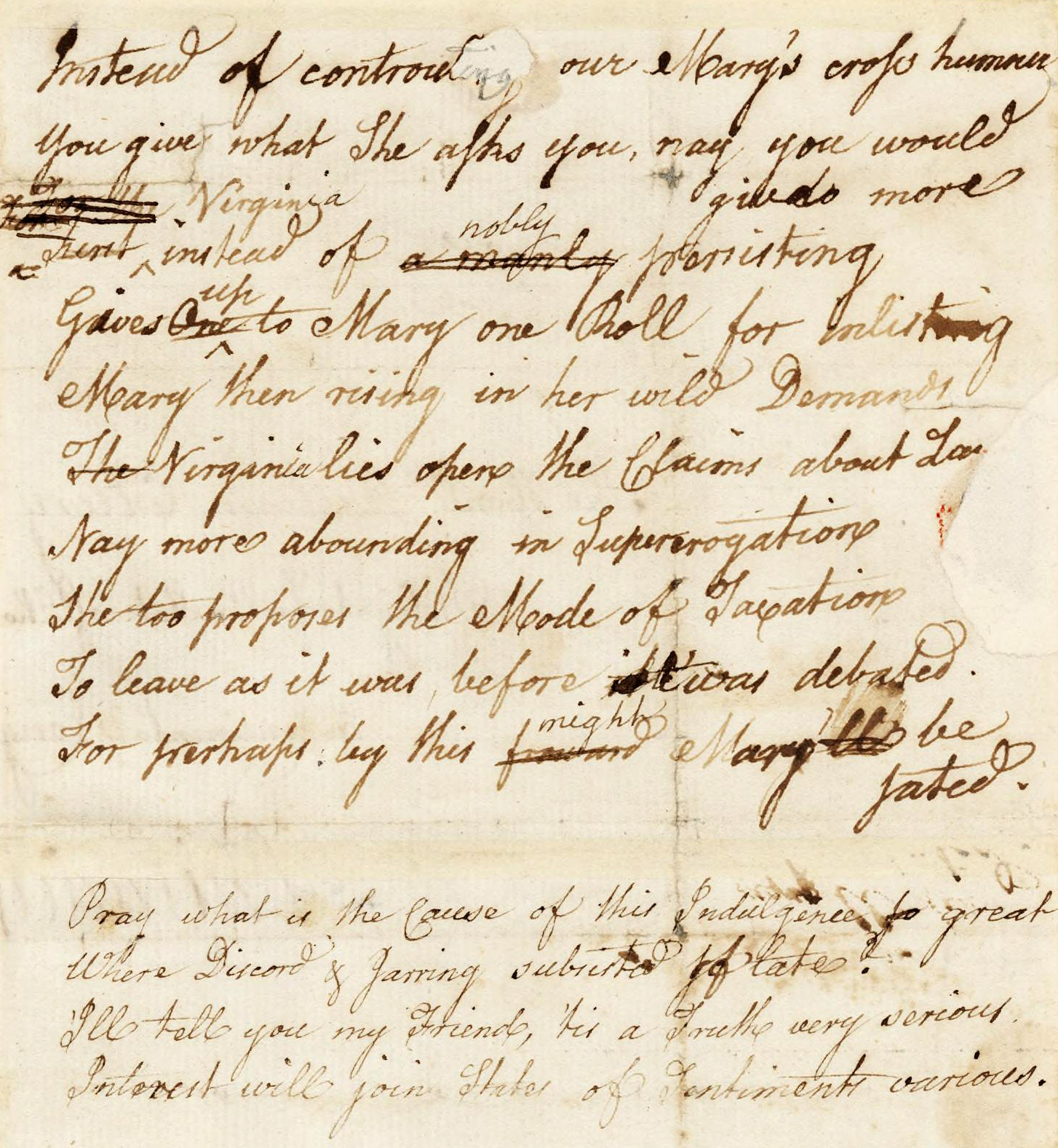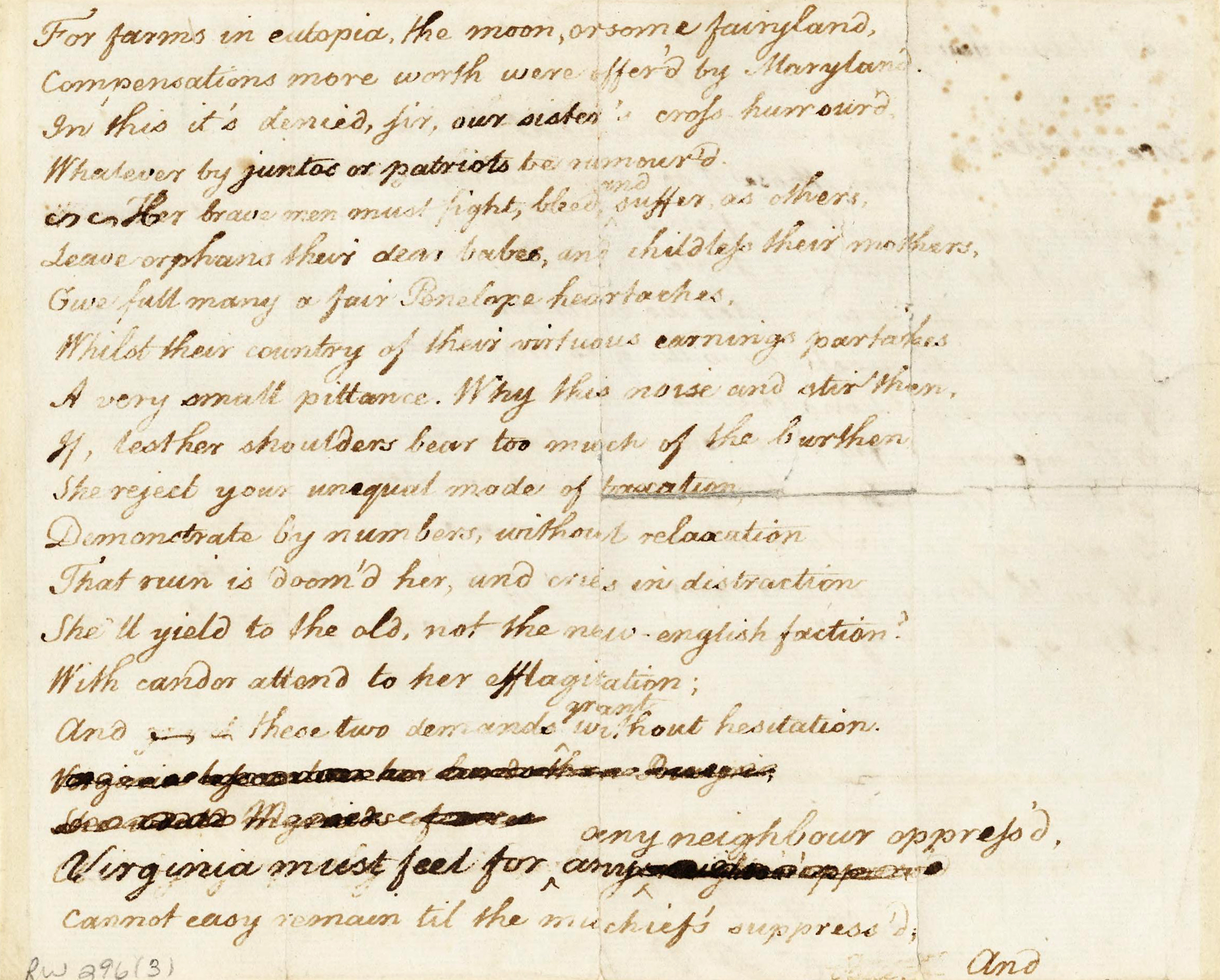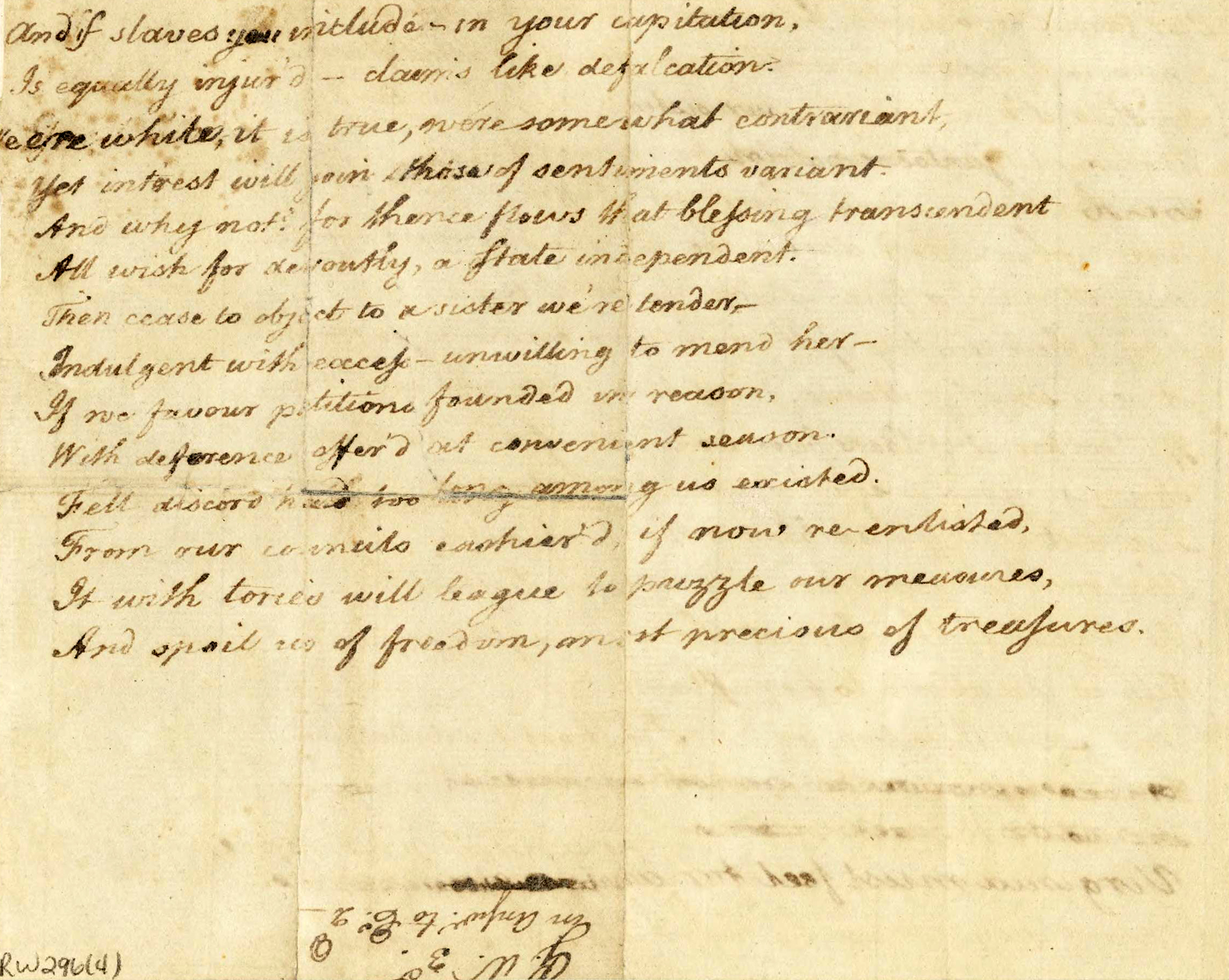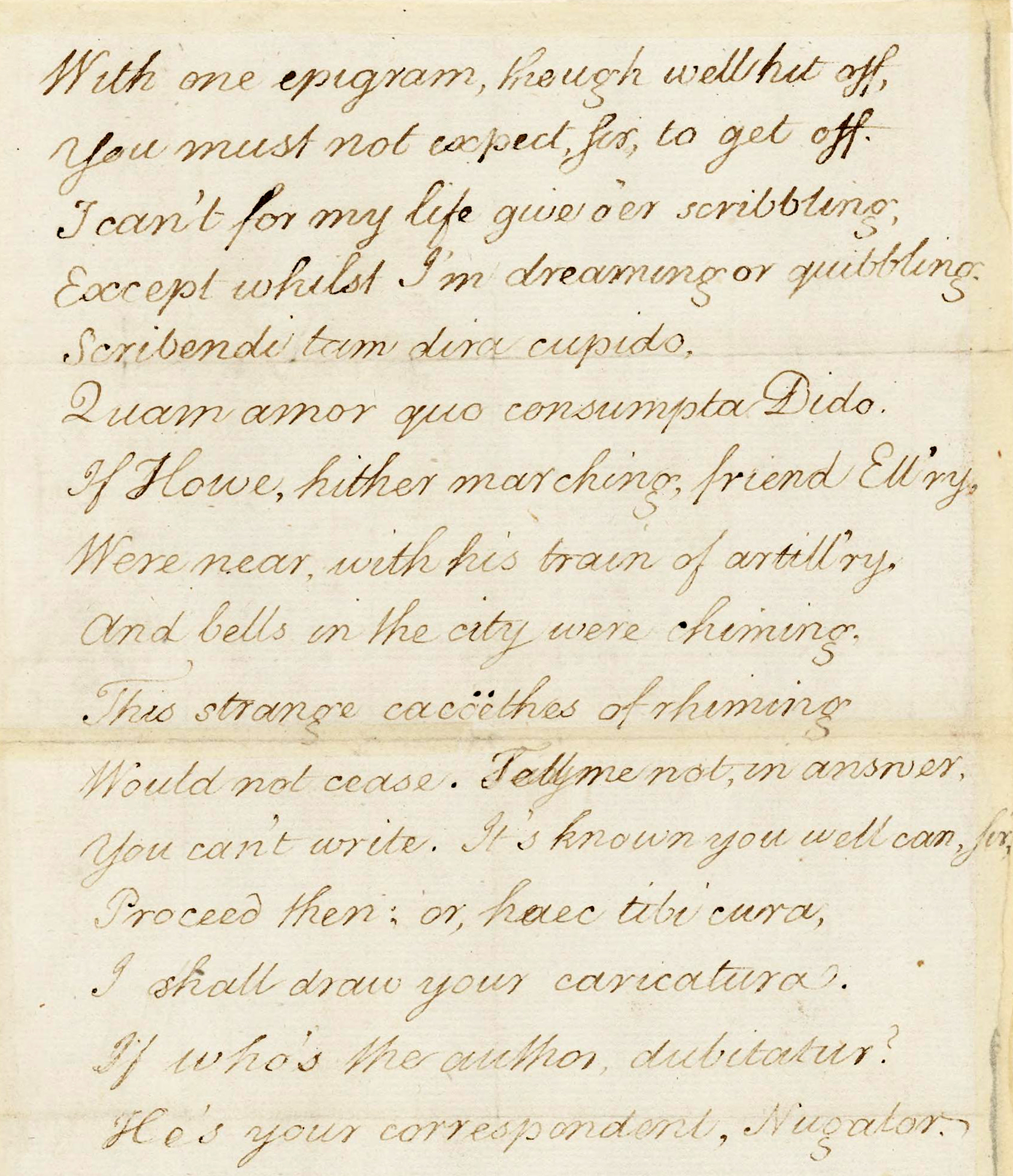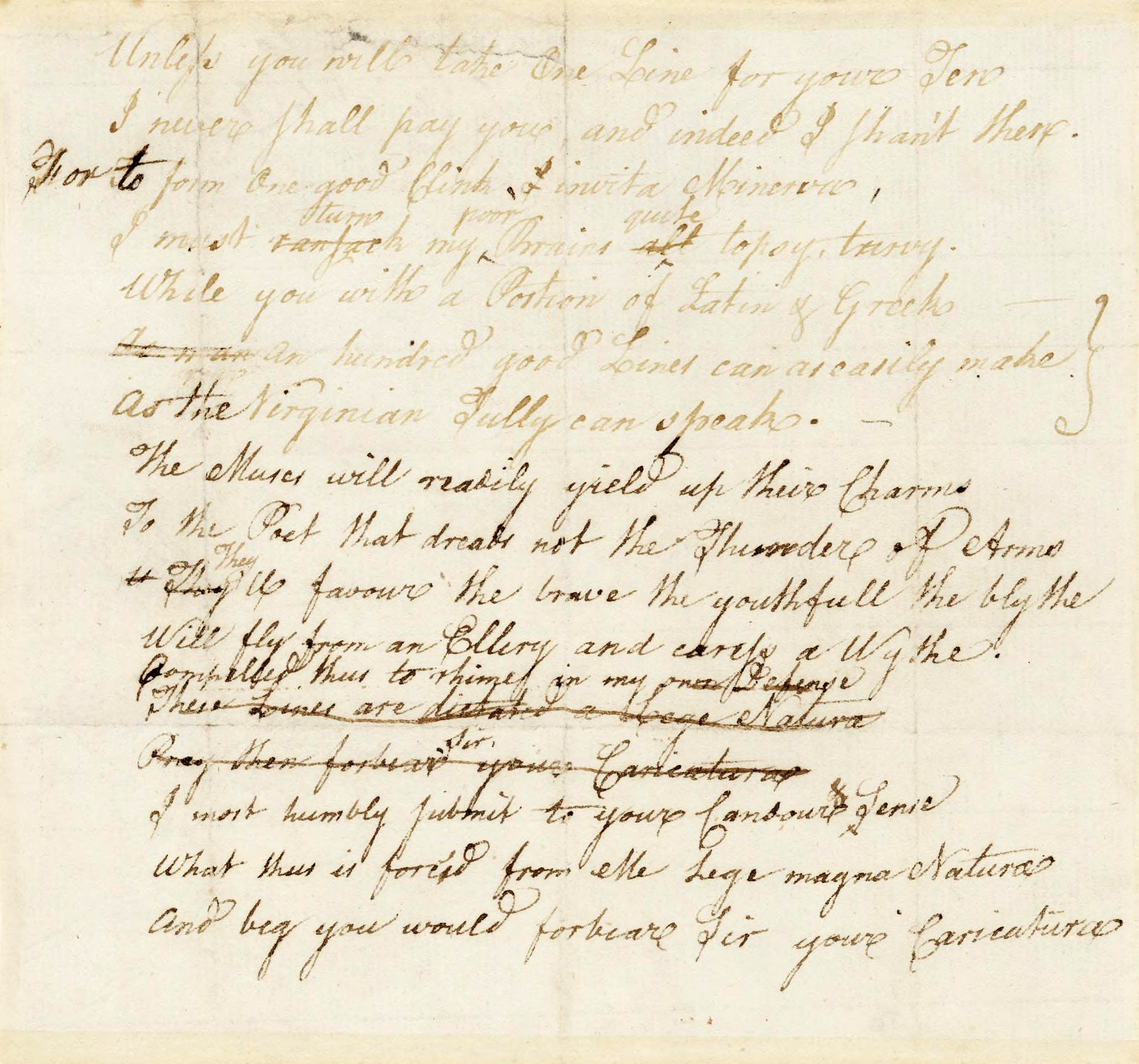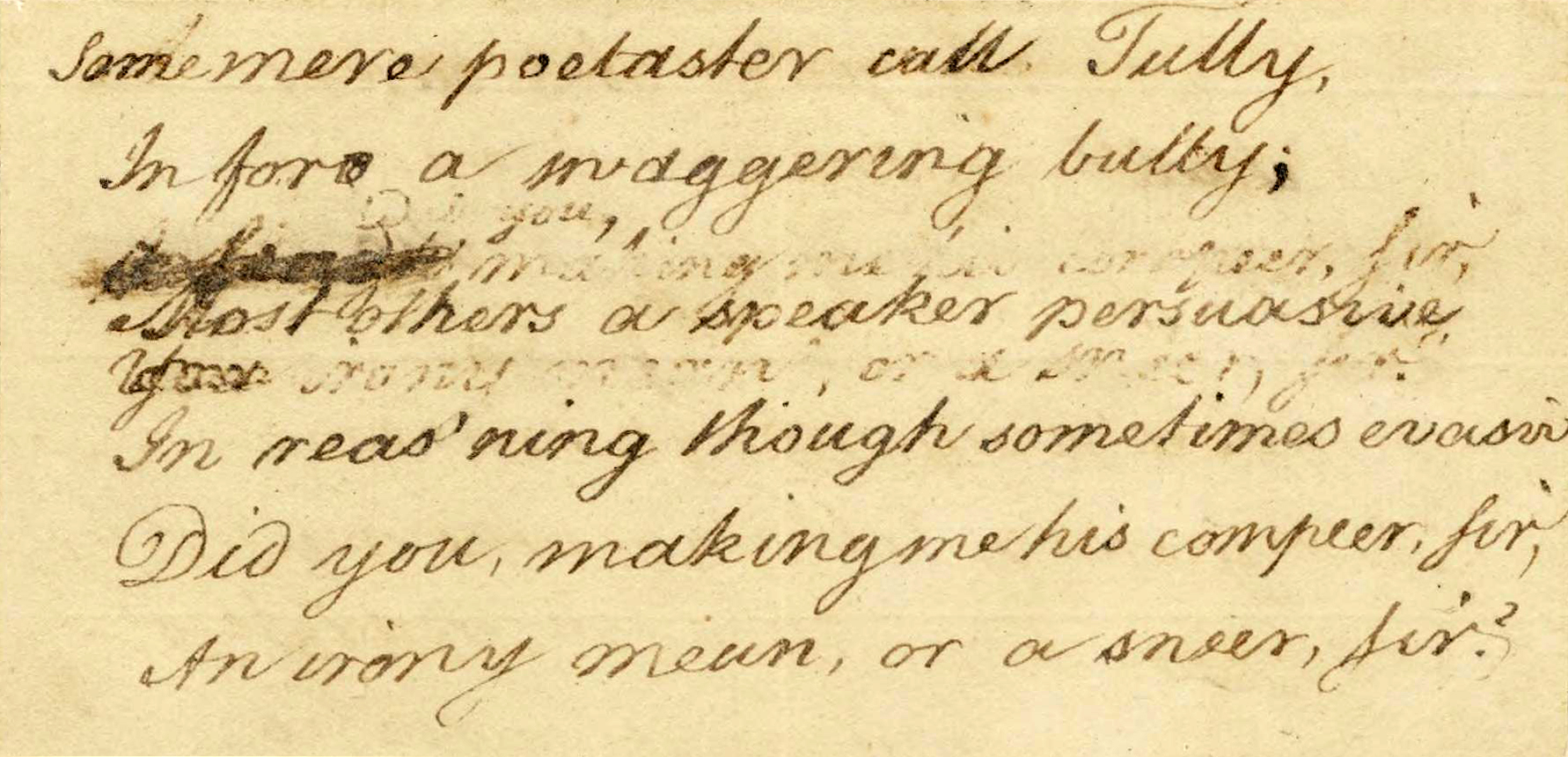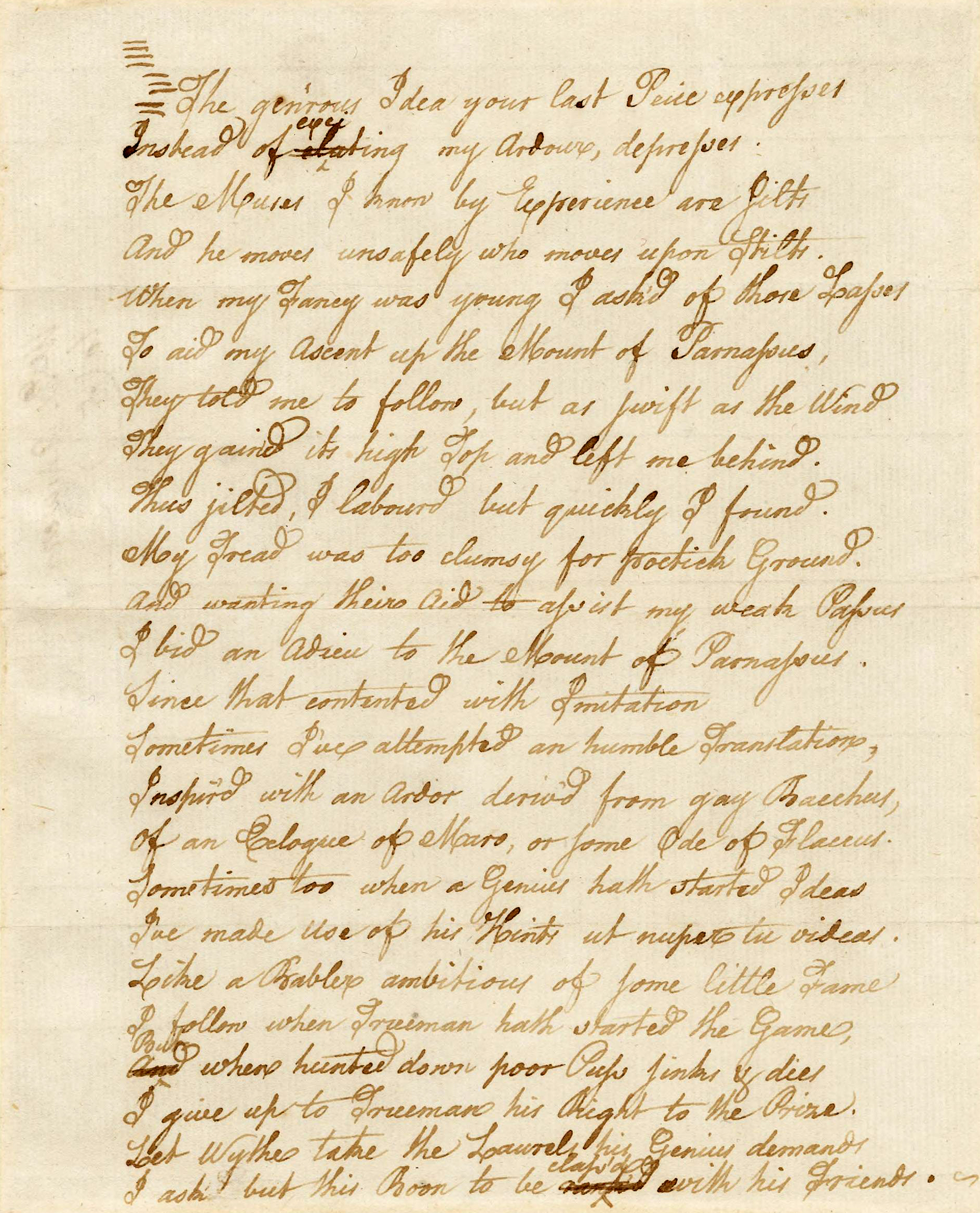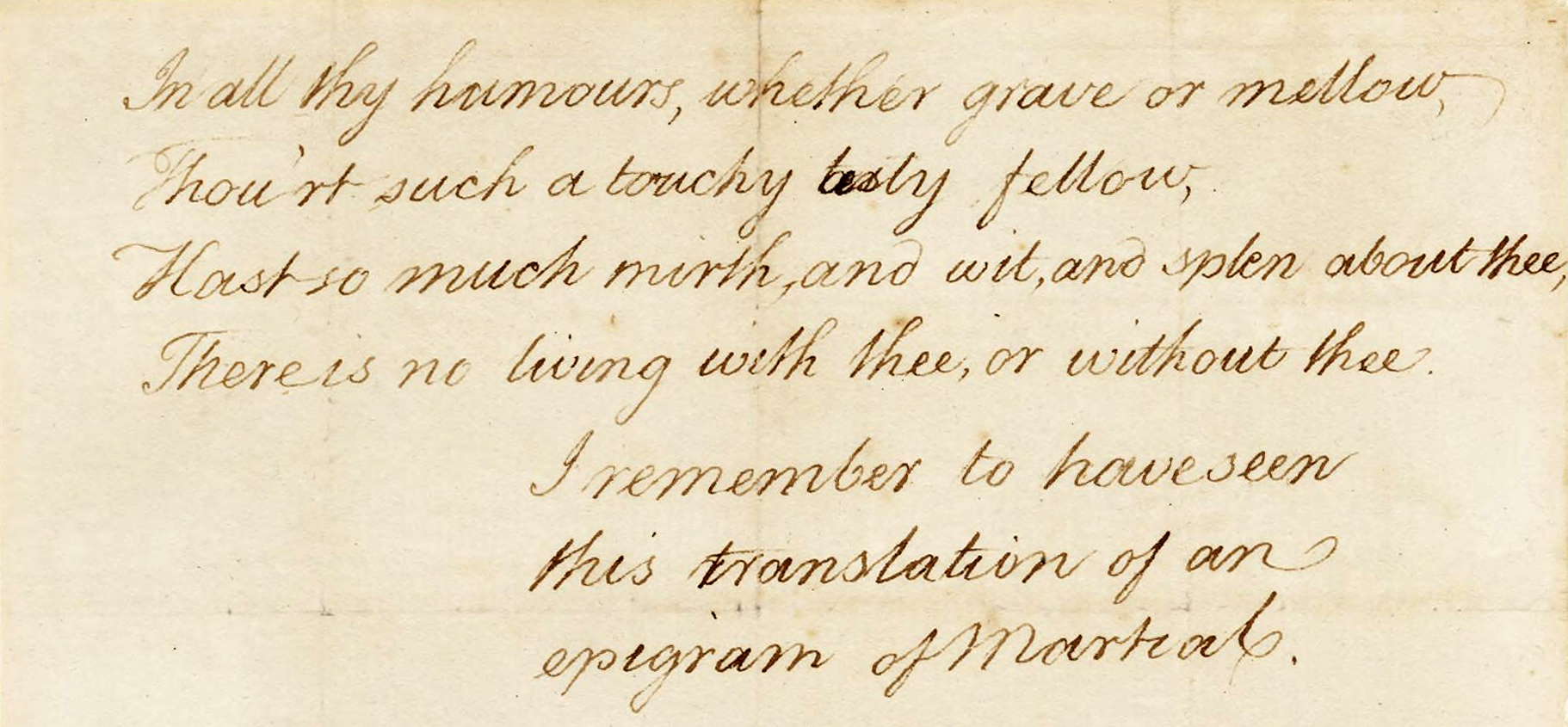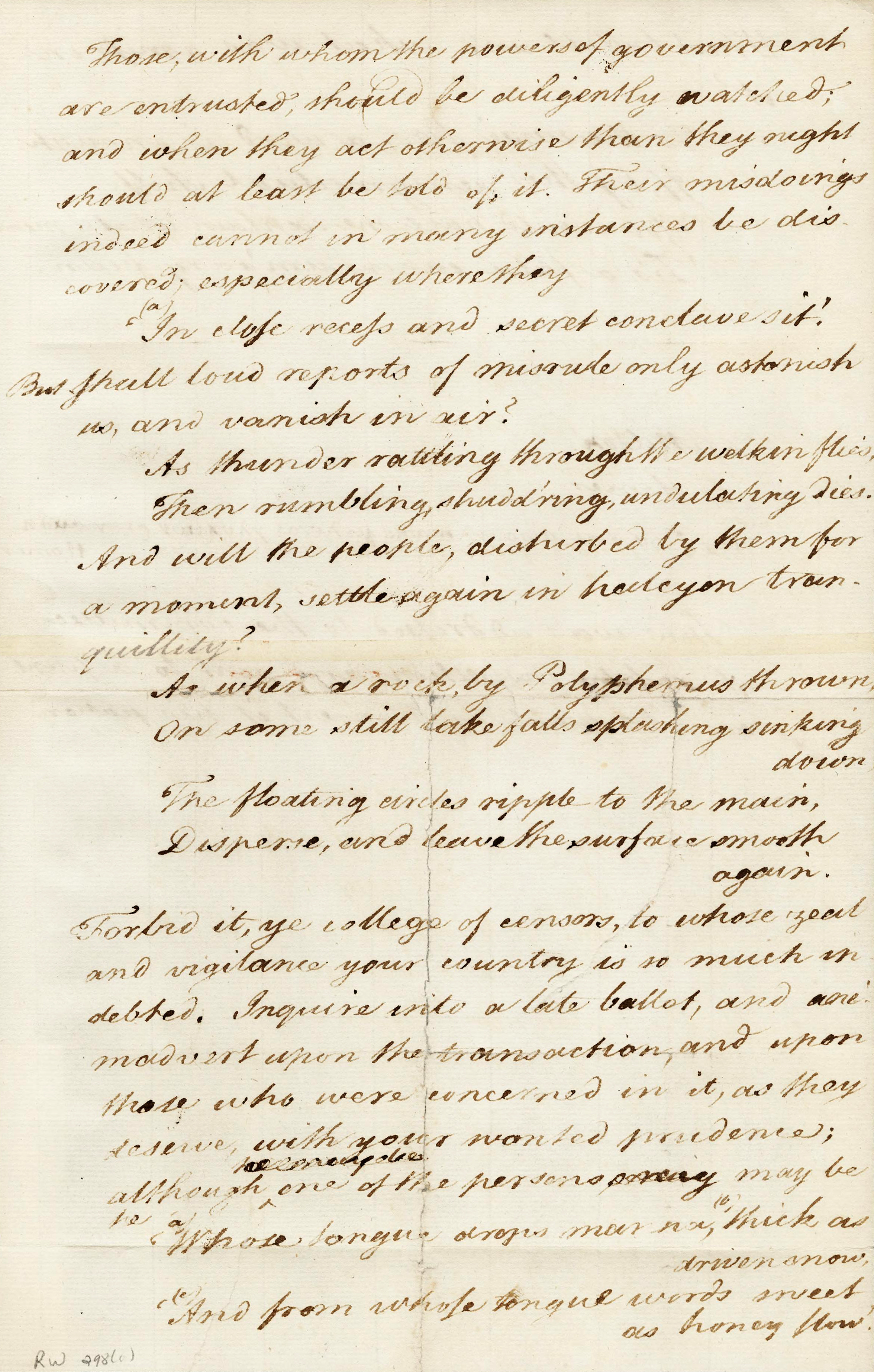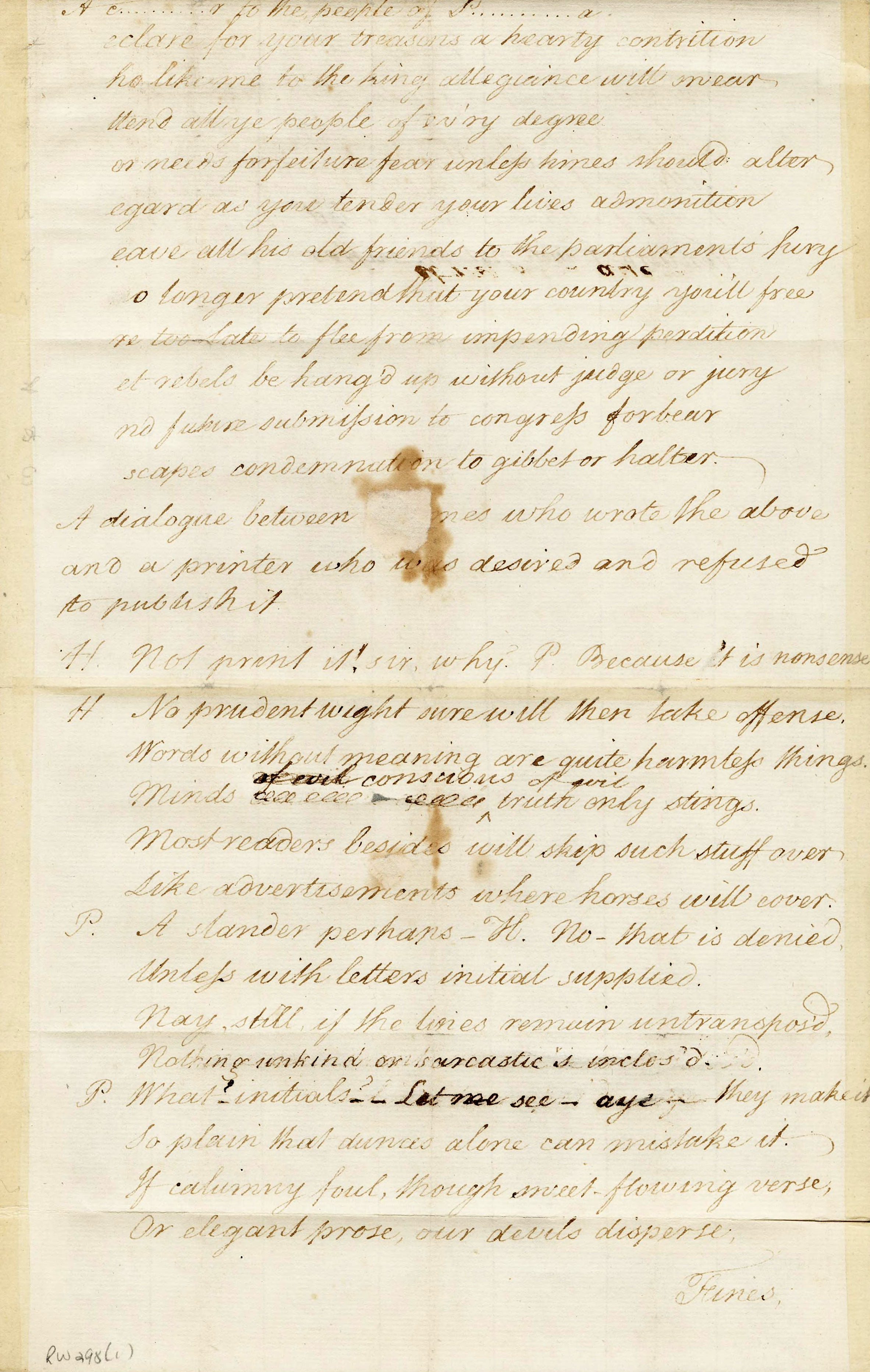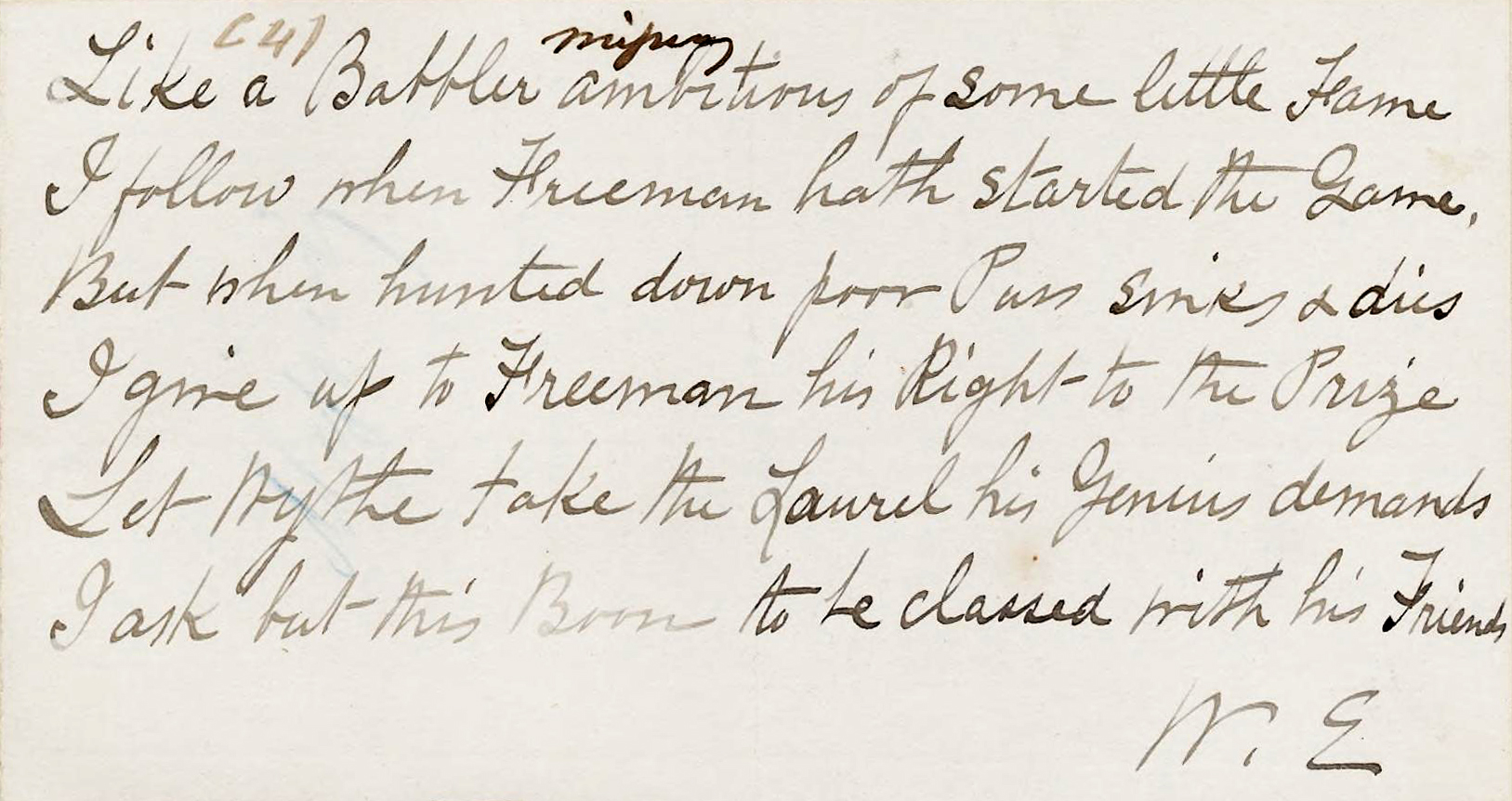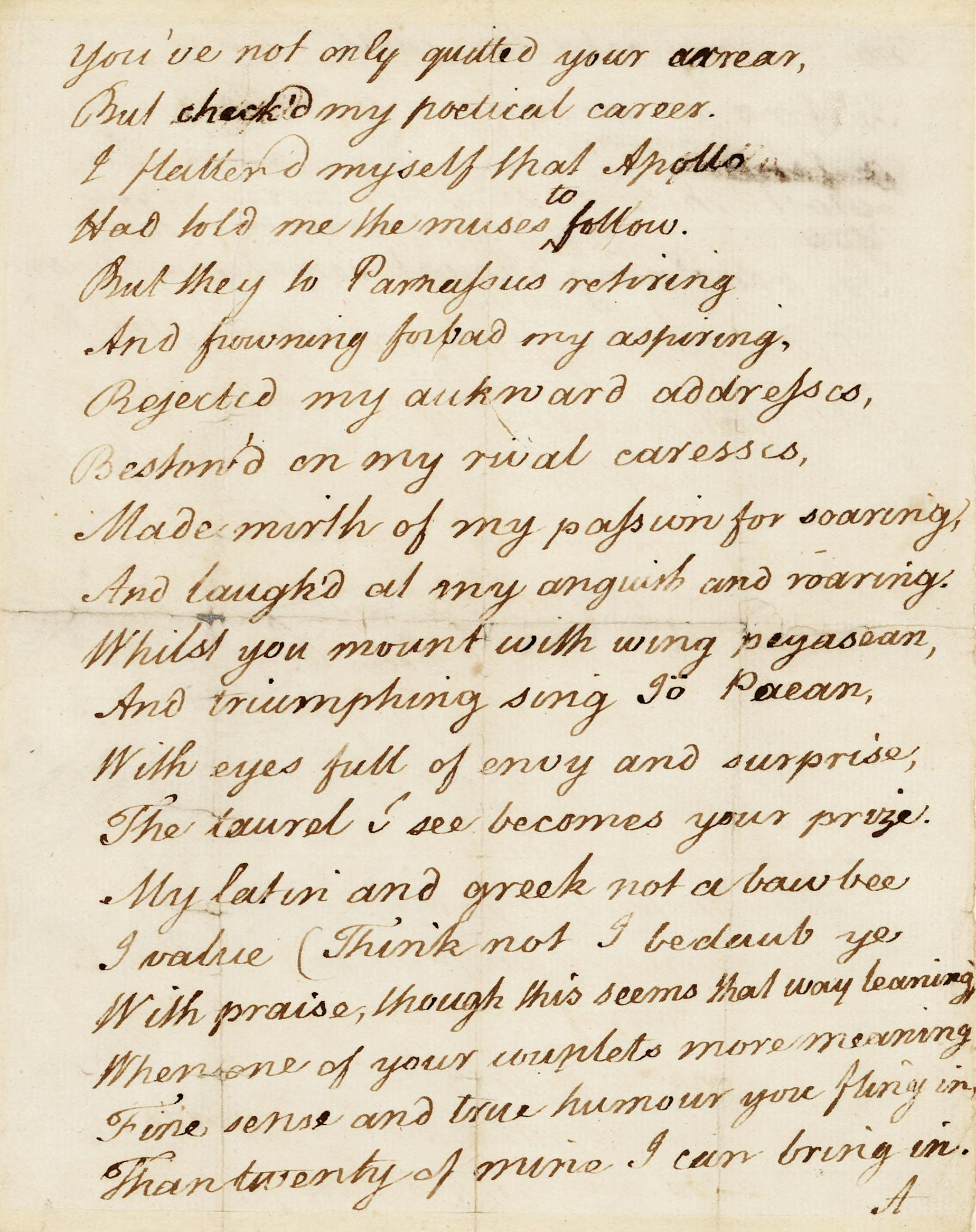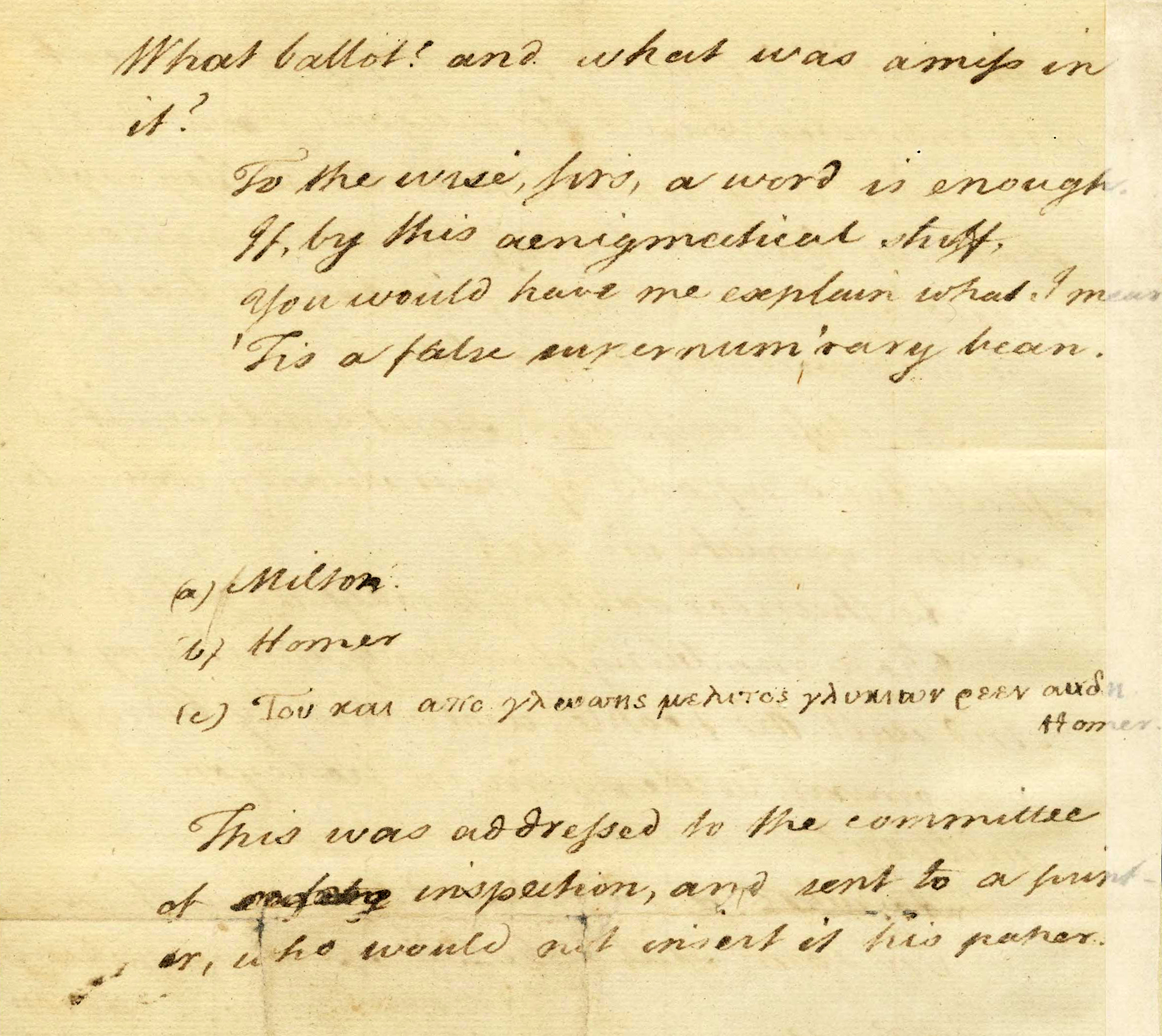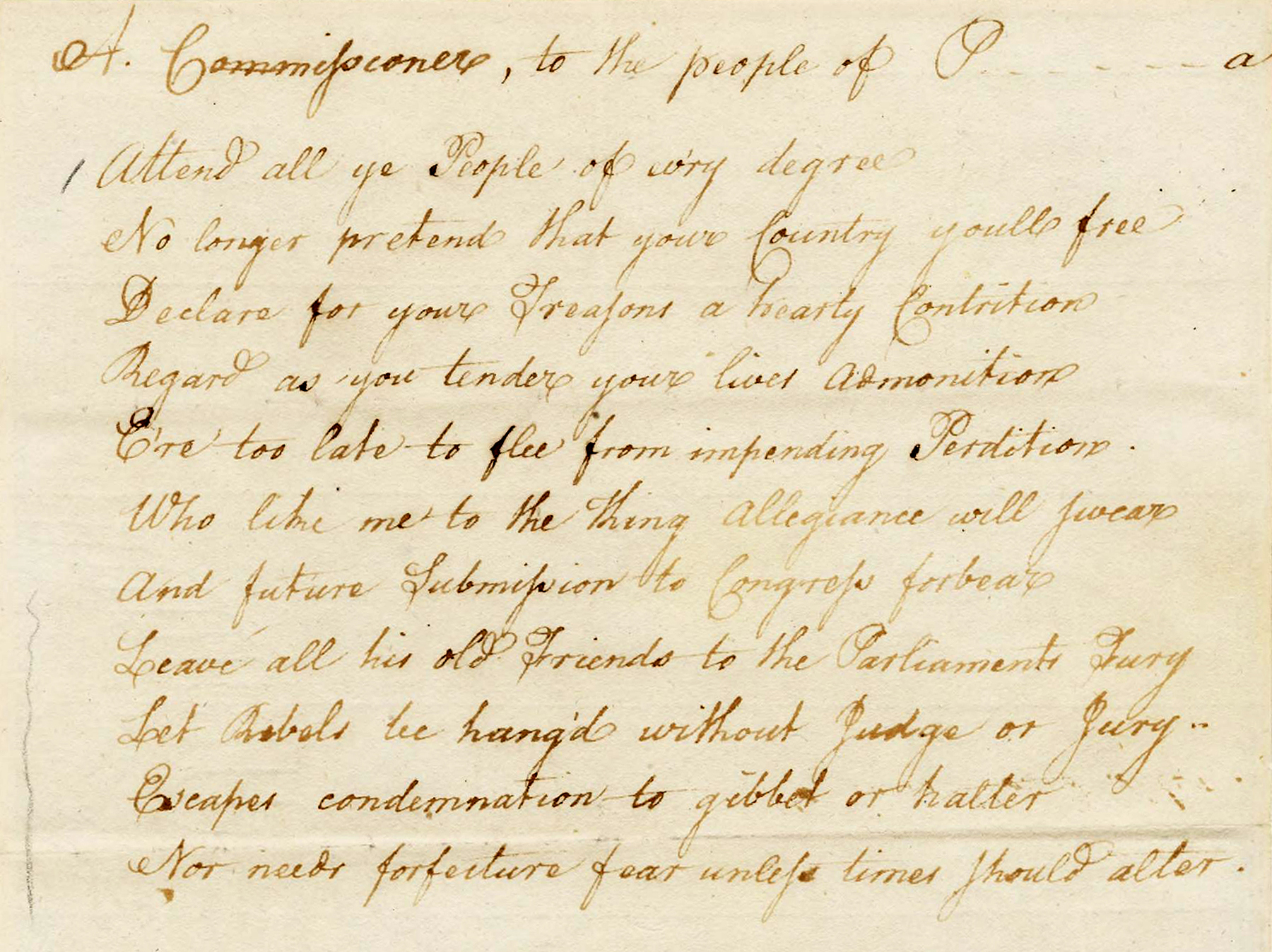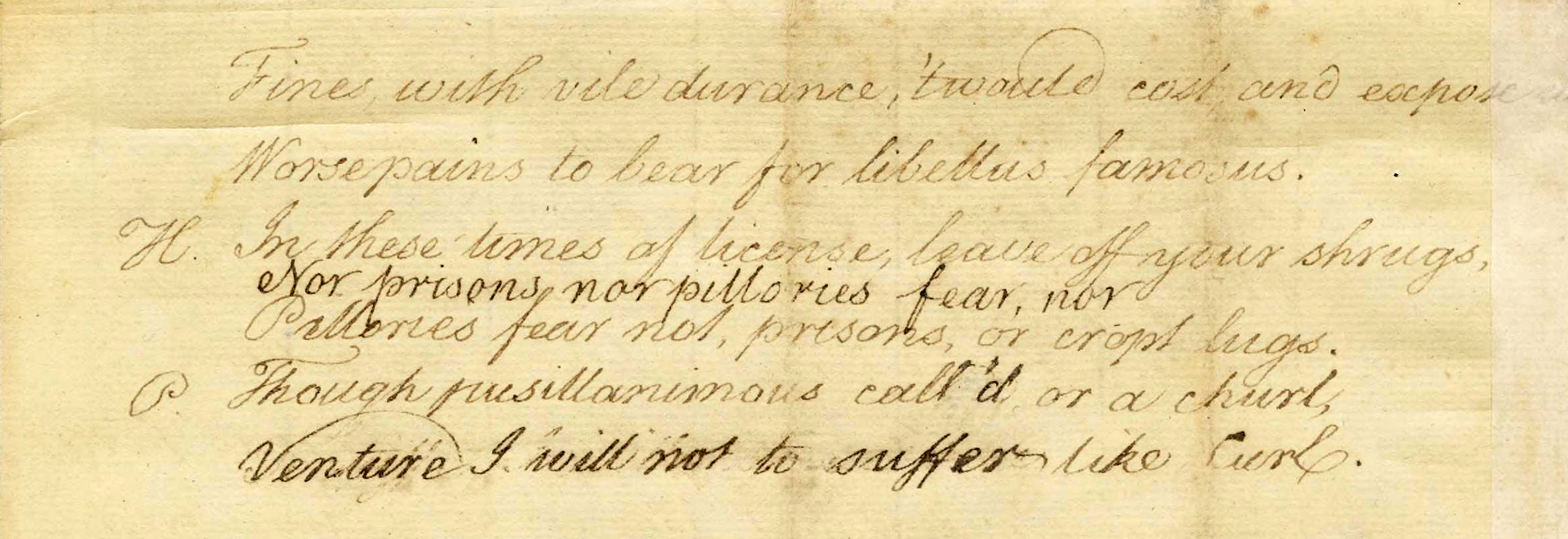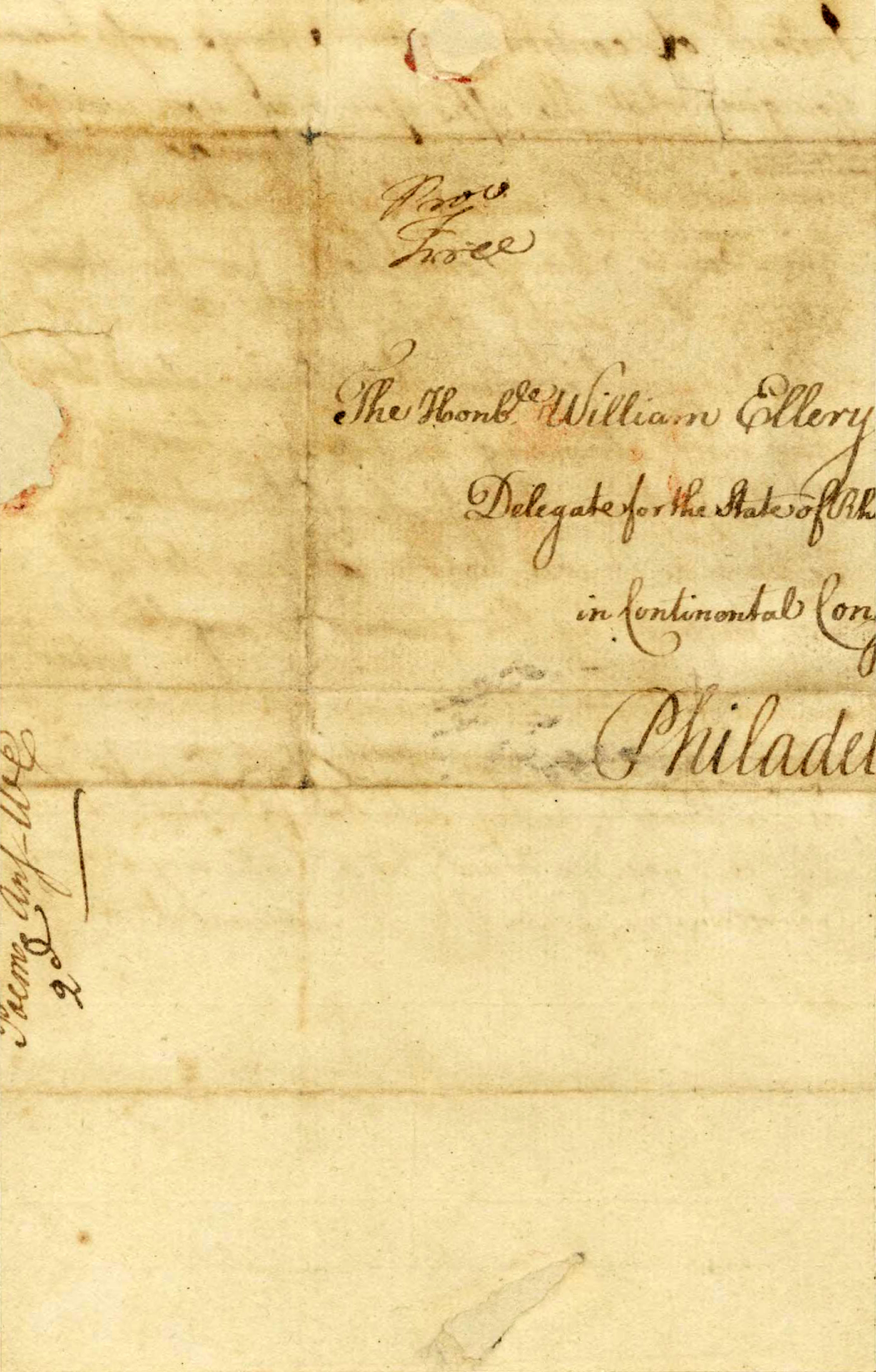
George Wythe (VA) and William Ellery (RI) exchanged verses on pieces of scrap paper during
Congress, as evidenced by this page, originally addressed to "The Hon. William Ellery, Delegate for the State of Rhode Island, in Continental Congress, Philadelphia."
George Wythe returned to the Second Continental Congress in Philadelphia sometime in mid-September, 1776.[1] By November, Congress was facing a split caused by the northern states offering additional pay to their soldiers, which the southern states could neither match nor afford. George Wythe, delegate from Virginia, addressed a short, humorous poem to William Ellery of Rhode Island, suggesting that the "Yankees" generosity would ruin Congress's efforts. Ellery responded in kind, and the two exchanged verses until Wythe left Congress to return to the Virginia Convention, in December.
The manuscripts were recognized in the collection of the Boston Public Library by W. Edwin Hemphill, who published an article on them in 1952: "George Wythe Courts the Muses: In Which, to the Astonishment of Everyone, That Silent, Selfless Pedant Is Found to Have Had a Sense of Humor."[2]
In 2013 the manuscript was digitized by the Boston Public Library, and made available in the Internet Archive.[3]
Contents
- 1 Manuscript text, November-December 1776
- 1.1 "A Member of the Antinovanglian Faction to W. E.," by George Wythe (VA)
- 1.2 "A Novanglican to G.W.," by William Ellery (RI)
- 1.3 "Instead of Controlling Our Mary's Cross Humor," by William Ellery
- 1.4 "For Farms in Utopia, the Moon, or Some Fairyland," by George Wythe
- 1.5 Epigram, by William Ellery
- 1.6 "With One Epigram, Though Well Hit Off" by George Wythe
- 1.7 "Unless You Will Take One Line for Your Ten," by William Ellery
- 1.8 "You've Not Only Quitted Your Arrear," by George Wythe
- 1.9 "The Gen'rous Idea Your Last Piece Expresses," by William Ellery
- 1.10 Martial, Epigram XII.47, in Wythe's hand
- 1.11 "Those with Whom the Powers of Government Are Entrusted," by George Wythe
- 1.12 "A Commissioner, to the People of Philadelphia," by William Ellery
- 1.13 Copy of Ellery's "A Commissioner, to the People of Philadelphia," in Wythe's Hand, with dialogue
- 2 See also
- 3 References
- 4 Further reading
- 5 External links
Manuscript text, November-December 1776
"A Member of the Antinovanglian Faction to W. E.," by George Wythe (VA)
A member of the antinovanglian faction to W. E.[4]
To works supererogation
By others, some owe their salvation.
To what the good yankees are doing
Their duty beyond, we owe ruin.
Epigram by the ingenious George Wythe Esq
For the two first Lines the author alludes to the Roman Catholics—
In the two first last to the additional Pay, and Bounty of given to
the Soldiers by the Eastern States.
|
|
|
"A Novanglican to G.W.," by William Ellery (RI)
|
A Novanglian to G. W.
As by works supererogatory
Rom. Caths are saved from purgatory,
So by what the Yankees good are doing
Buckskins will save from utter Ruin.
|
|
|
"Instead of Controlling Our Mary's Cross Humor," by William Ellery
|
Instead of controlling our Mary's cross humour
You give what she asks you. Nay, you would do more
For the First Virginia, instead of a manly nobly persisting
Gives One up to Mary one Roll for enlisting.
Mary then rising in her wild Demands
The Virginia lays open the Claims about Lands
Nay, more abounding in Supererogation,
She too proposes the Mode of Taxation
To leave as it was before it was debated
For perhaps by this forward mighty Mary'll be sated.
Pray, what is the Cause of this Indulgence so great
Where Discord & Jarring subsisted of late?
Ill tell you, my Friend, 'tis a truth very serious:
Interest will join States of Sentiments various.
|
|
|
"For Farms in Utopia, the Moon, or Some Fairyland," by George Wythe
|
For farms in eutopia, the moon, or some fairyland,
Compensations more worth were offered by Maryland.
In this it's denied, Sir, our sister's cross humour'd,
Whatever by juntos or patriots be rumour'd.
Her brave men must fight, bleed, and suffer as others,
Leave orphans their dear babes, and childless their mothers,
Give full many a fair Penelope heartaches,
Whilst their country of their virtuous earnings partakes
A very small pittance. Why this noise and stir then,
If, lest her shoulders bear too much of the burthen,
She reject your unequal mode of taxation,
Demonstrate by numbers, without relaxation,
That ruin is doom'd her, and cries in distraction
She'll yield to the old, not the new-english faction?
With candor attend to her efflagitation,
And these two demands grant without hesitation.
Virginia must feel for any neighbour oppress'd,
Cannot easy remain til the mischief's suppress'd;
And
|
|
|
|
And if slaves you include in your capitation,
Is equally injur'd—claims like defalcation.
E'ene while, it is true, we're somewhat contrarient,
Yet interest will join those of sentiments variant.
And why not? For thence flows that blessing transcendent
All wish for devoutly, a state independent.
Then cease to object to a sister we're tender,
Indulgent with excess—unwilling to mend her,
If we favour petitions founded on reason,
With deference offer'd at convenient season.
Fell discord had too long among us existed.
From our councils cashier'd, if now re-enlisted,
It with tories will league to puzzle our measures,
And spoil us of freedom, most precious of treasures.
|
|
Epigram, by William Ellery
|
Like a Babbler ambitious of some little Fame
I follow when Freeman hath started the Game,
But when hunted down poor Puss sinks & dies
I give up to Freeman his Right to the Prize
Let Wythe take the Laurel his Genius demands
I ask but this Boon to be classed with his Friends.
W. E.
|
|
|
"With One Epigram, Though Well Hit Off" by George Wythe
|
With one epigram, though well hit off,
You must not expect, Sir, to get off.
I can't for my life give o'er scribbling,
Except whilst I'm dreaming or quibbling.
Scribendi tam dira cupido,[5]
Quam amor quo consumpta Dido.[6]
If Howe,[7] hither marching, friend Ell'ry,
Were near with his train of artill'ry
And bells in the city were chiming,
This strange cacoëthes of rhiming
Would not cease. Tell me not, in answer,
You can't write. It's known you well can, Sir,
Proceed then; or haec tibi cura,[8]
I shall draw your caricatura.
If who's the author, dubitatur?[9]
He's your correspondent, Nugator.[10]
|
|
|
"Unless You Will Take One Line for Your Ten," by William Ellery
|
Unless you will take one Line for your Ten
I never Shall pay you, and indeed I shan't then.
For to form One good Clink, invita Minerva,[11]
I must ransack turn my poor Brains all quite topsy, turvy.
While you with a Portion of Latin & Greek
As n an An hundred good Lines can easily make
As the Virginian Tully[12] can speak.
The Muses will readily yield up their Charms
To the Poet that dreads not the Thunder of Arms
They'll favour the brave the youthfull the blythe
Will fly from an Ellery and caress a Wythe
Compelled thus to rhime in my own Defense
These Lines are dictated a Lege Natura
Pray then forbear Sir, your Caricatura
I most humbly submit to your Candour & Sense.
What thus is forced from Me Lege magna Natura[13]
And beg you would forbear Sir your Caricatura
|
|
|
"You've Not Only Quitted Your Arrear," by George Wythe
|
You've not only quitted your arrear,
But check'd my poetical career.
I flatter'd myself that Apollo
Had told me the Muses to follow.
But they to Parnassus retiring
And frowning forbade my aspiring,
Rejected my awkward addresses,
Bestow'd on my rival caresses,
Made mirth of my passion for soaring,
And laugh'd at my anguish and roaring.
Whilst you mount with wing pegasean
And triumphint, sing Iö Paean,[14]
With eyes full of envy and surprise,
The laurel I see becomes your prize.
My latin and greek not a bawbee[15]
I value (Think not I bedaub ye
With praise, though this seems that way leaning)
When one of your couplets more meaning
Fine sense and true humour you fling in,
Than twenty of mine I can bring in.
A
|
|
|
|
Some mere poetaster call Tully,
In for a naggering bully;
Most others a speaker persuasive,
In reas'ning though sometimes evasive
Did you, making me his compeer, Sir,
An irony mean, or a sneer, Sir?
|
|
|
"The Gen'rous Idea Your Last Piece Expresses," by William Ellery
|
The gen'rous Idea your last Peice [sic] expresses
Instead of exal exciting my Ardour, depresses.
The Muses I know by Experience are Gilts
And he moves unsafely who moves upon Stilts.
When my Fancy was young I asked of those Lasses
To aid my Ascent up the Mount of Parnassus,
They told me to follow, but as swift as the Wind
They gained its high Top and left me behind.
Thus jilted, I labour'd but quickly I found
My Tread was too clumsy for poetick Ground.
And wanting their Aid to assist my weak Passes
I bid an Adieu to the Mount of Parnassus.
Since that contented with Limitation
Sometimes I've attempted an humble Translation,
Inspired with an Ardour deriv'd from gay Bacchus,
Of an Eclogue of Mars or some Ode of Flaccus.
Sometimes too when a Genius hath started Ideas
I've made use of his Hints ut nuper to videa.[16]
Like a Babbler ambitious of some little Fame
I follow when Freeman hath started the Game,
And But when hunted down poor Puss sinks & dies
I give up to Freeman his Right to the Prize.
Let Wythe take the Laurel his Genius demands
I ask but this Boon to be rank'd class'd with his Friends.
|
|
|
Martial, Epigram XII.47, in Wythe's hand
In his 1952 article, Edwin Hemphill suggests that this scrap may have been sent by Wythe in a 1778 letter to Samuel Adams, asking him to share an enclosure with William Ellery, whom Wythe had not heard from since leaving Philadelphia in December, 1776.
|
In all thy humours, whether grave or mellow,
Thou'rt such a touchy, testy fellow,
Hast so much mirth, and wit, and splen about thee,
There is no living with thee, or without thee.
I remember to have seen
this translation of an
epigram of Martial.[17]
|
|
|
"Those with Whom the Powers of Government Are Entrusted," by George Wythe
In this mix of prose and verse, Wythe seems to be trying to bring to light some complaint with Congress regarding a late ballot (perhaps with a remonstrance toward their agreement of secrecy), which he entreats the "college of censors" to inquire upon, despite one of the persons involved being as respected as Nestor of Greek mythology (but false as Milton's Belial):
|
Those with whom the powers of government are entrusted should be diligently watched; and when they act otherwise than they ought should at least be told of it. Their misdoings indeed cannot in many instances be discovered especially where they
(a) 'In close recess and secret conclave sit!'[18]
But shall loud reports of misrule only astonish us, and vanish in air?
As thunder rattling though the welkin flies,
Then rumbling shudd'ring, undulating dies.
And will the people, disturbed by them for a moment, settle again in halcyon tranquillity?
As when a rock, by Polyphemus thrown,
On some still lake falls splashing sinking down
The floating circles ripple to the main,
Disperse, and leave the surface smooth again.
Forbid it, ye college of censors, to whose zeal and vigilance your country is so much indebted. Inquire into a late ballot, and animadvert upon the transaction, and upon those who were concerned in it, as they deserve, with your wanted prudence; although one of the persons may be he
(a) 'Whose tongue drops manna,[19] (b) thick as driven snow,[20]
(c) 'And from whose tongue words sweet as honey flow.'[21]
|
|
|
|
What ballot? and what was amiss in it?
To the wise, Sirs, a word is enough.
If, by this aenigmatical stuff,
You would have me explain what I mean,
'Tis a false supernum'rary bean.
(a) Milton
(b) Homer
(c) τοῦ καὶ ἀπὸ γλώσσης μέλιτος γλυκίων ῥέεν αὐδή[22]
- Homer.
This was addressed to the committee of safety inspection, and sent to a printer, who would not insert it his paper.
|
|
|
"A Commissioner, to the People of Philadelphia," by William Ellery
In this poem, Ellery chastises the conservative position of Andrew Allen, delegate from Pennsylvania, for his commonwealth's reluctance to support independence from Great Britain. The first letter of each line spells out "ANDREW ALLEN" (emphasized here).[23] Ellery and Wythe apparently attempted to get the poem published, as there is another copy in Wythe's handwriting with the lines transposed to avoid obvious "libellus famosos" (libel), and a dramatized dialogue with a reluctant printer:
|
A Commissioner, to the people of P _ _ _ _ _ a
Attend all ye People of ev'ry degree
No longer pretend that your Country you'll free
Declare for your Treasons a hearty Contrition
Regard as you tender your lives Admonition
E're too late to flee from impending Perdition
Who like me to the King Allegiance will swear
And future Submission to Congress forbear
Leave all his old Friends to the Parliaments Fury
Let Rebels be hang'd without Judge or Jury
Escapes condemnation to gibbet or halter
Nor needs forfeiture fear unless times should alter.
|
|
|
Copy of Ellery's "A Commissioner, to the People of Philadelphia," in Wythe's Hand, with dialogue
|
A C . . . . . . . . . . r to the people of P . . . . . . . . . . a
Declare for your treasons a hearty contrition
Who like me to the king allegiance will swear
Attend all ye people of ev'ry degree
Nor needs forfeiture fear unless times should alter.
Regard as you tender your lives admonition
Leave all his old friends to the parliaments fury
No longer pretend that your country you'll free
E're too late to flee from impending perdition
Let rebels be hang'd up without judge or jury
And future submission to congress forbear
Escapes condemnation to gibbet or halter.
A dialogue between [manuscript damaged] who wrote the above
and a printer who was desired and refused
to publish it.
H. Not Print it! sir, why? P. Because it is nonsense.
H. No prudent wight sure will then take offense.
Words without meaning are quite harmless things.
Minds of evil conscious of evil truth only stings.
Most readers besides will skip such stuff over,
Like advertisements where horses will cover.
P. A slander perhaps— H. No—that is denied,
Unless with letters initial supplied.
Nay, still if the lines remain untransposed,
Nothing unkind or sarcastic's inclos'd.
P. What? initials?—Let me see—aye—they make it
So plain that dunces alone can mistake it.
If calumny foul, though sweet flowering verse,
Or elegant prose, our devils disperse,
Fines.
|
|
|
|
Fines with vile durance, 'twould cost and expose us
Worse pains to bear for libellus famosus.[24]
H. In these times of license leave off your shrugs,
Nor prisons nor pillories fear, nor
Pillories fear not, nor prisons or cropt lugs.[25]
P: Though pusillanimous call'd or a churl,
Venture I will not to suffer like Curl.[26]
|
|
|
See also
References
- ↑ The exact date of Wythe's arrival in Philadelphia is not known. Wythe's signature does not appear on a letter from the Virginia delegates to the Pennsylvania delegates dated September 12, 1776, regarding a temporary border between the two commonwealths (Peter Force, American Archives, 5th ser. (Washington, D.C.: M. St. Clair and Peter Force, 1851) 2:42; but Josiah Bartlett, in a letter to William Whipple dated September 14, reports "Mr. Wythe is come to Congress." Edmund C. Burnett, ed. Letters of Members of the Continental Congress, vol. 2, July 5, 1776 to December 31, 1777 (Washington, D.C.: Carnegie Institution of Washington, 1921), 89.
- ↑ W. Edwin Hemphill, "George Wythe Courts the Muses," William and Mary Quarterly 3rd ser., 9, no. 3 (July 1952), 338-345.
- ↑ Poems on witty subjects in Congress (manuscript), by Ellery, William, 1727-1820; Wythe, George, 1726-1806; Boston Public Library, American Revolutionary War Manuscripts Collection.
- ↑ "Novanglian": New Englander.
- ↑ "Dire desire to write," paraphrase of Virgil, Aeneid, Book V, line 721.
- ↑ "The love which consumed Dido," Queen of Carthage.
- ↑ General William Howe, (1729 – 1814), Commander-in-Chief of British forces during the American Revolutionary War, captured Philadelphia in September, 1777.
- ↑ Ovid, Ex Ponto III, xxxvi.
- ↑ Dubitatur: "It is doubted."
- ↑ Jester, clown.
- ↑ Defy nature, literally "go against Minerva's will." Cicero, De Officiis, I, 31, 110.
- ↑ Wythe is a Virginian Cicero: Marcus Tullius Cicero.
- ↑ A great law of Nature.
- ↑ Classical Greek cry of exultation or triumph, traditionally addressed to Apollo the healer.
- ↑ Bawbee: a Scottish half-penny.
- ↑ "As of late, you see."
- ↑ A translation matching Wythe's version of Marcus Valerius Martialis' epigram 12.47, translated by Joseph Addison, appeared in The Spectator on May 18, 1711:
Difficilis, facilis, jucundus, acerbus es idem,
Nec tecum possum vivere, nec sine te.
In all thy humours, whether grave or mellow,
Thou'rt such a touchy, testy, pleasant fellow;
Hast so much wit, and mirth, and spleen about thee.
There is no living with thee, nor without thee.
An "odd volume" of The Spectator is listed in Thomas Jefferon's inventory of Wythe's library, among the books given to his son-in-law, Thomas Mann Randolph.
- ↑ Milton's demonic council in Paradise Lost, Book I, lines 792-797: "But far within, / And in their own dimensions, like themselves, / The great seraphic lords and cherubim/In close recess and secret conclave sat; / A thousand demigods on golden seats / Frequent and full."
- ↑ Milton, Paradise Lost, Book II, lines 112-113: "On the other side uprose / Belial, in act more graceful and humane. / A fairer person lost not Heaven; he seemed no / For dignity composed, and high exploit,/But all was false and hollow, though his tongue / Dropped manna, and could make the worse appear / The better reason, to perplex and dash / Maturest counsels...."
- ↑ Homer, Iliad, Book XII, lines 278-279: Stones are volleyed by the Trojans and Achaeans "as flakes of snow fall thick on a winter's day."
- ↑ Homer's admiration of Nestor, in the Iliad, Book I, line 249: "But Atreides / raged still on the other side, and between them Nestor / the fair-spoken rose up, the lucid speaker of Pylos, / from whose lips the streams of words ran sweeter than honey."
- ↑ Wythe translates this line of Homer as "And from whose tongue words sweet as honey flow."
- ↑ Imogene Brown, American Aristides (Rutherford N.J.: Fairleigh Dickinson University Press, 1981), 157, 166 n189.
- ↑ Libellus famosos: libel.
- ↑ A reference to the colonial punishment of cutting off ears?
- ↑ Edmund Curll (c. 1675 – 1747), whose name was synonymous with "unscrupulous publication and publicity."
Further reading
- Fowler, William M. William Ellery: A Rhode Island Politico and Lord of Admiralty. Metuchen, NJ: Scarecrow Press, 1973.
External links

